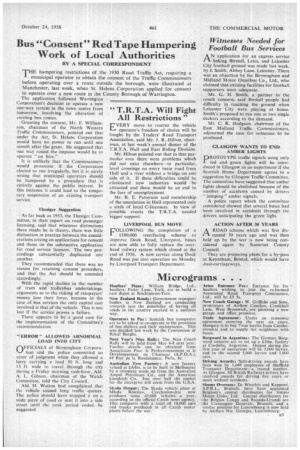Bus "Consent" Red Tape Hampering Work of Local Authorities
Page 37

If you've noticed an error in this article please click here to report it so we can fix it.
. BY A SPECIAL CORRESPONDENT
THE hampering restrictions of the 1930 Road Traffic Act, requiring a municipal operator to obtain the consent of the Traffic Commissioners before operating over a route outside the borough, were illustrated at
Manchester, last week, when St. Helens Corporation applied for consent to operate over a new route in the County Borough of Warrington.
Granting the consent, Mr. F. Williamson, chairman of the North Western Traffic Commissioners, pointed out that under the Act, St. Helens Corporation would have no power to run until one month after the grant. He suggested that one way round the impasse would be to operate "on hire."
It is unlikely that the Commissioners would prosecute if the' Corporation elected to run irregularly, but it is surely wrong that municipal operators should be hampered by a procedure that is entirely against the public interest. In this instance it could lead to the temporary suspension of an existing transport service.
Thesiger Suggestion As far back as 1953, the Thesiger Committee, in their report on road passenger licensing, said that whatever distinctions there might be in theory, thcre was little distinction in practice between the considerations arising on applications for consent and those on the substantive application for road service licences. The two proceedings substantially duplicated one another.
They recommended that there was no reason for retaining consent procedure, and that the Act should be amended accordingly.
With the rapid decline in the number of tram and trolleybus undertakings, arguments as to the risking of ratepayers' money lose their force, because in the case of bus services the only capital cost involved is that of the vehicle. This is not lost if the service proves a failure.
There appears Co be a good case for the implementation of the Committee's recommendation.
"ERROR" ALLOWED ABNORMAL LOAD INTO CITY
rIFFICIALS of Birmingham Corpora
tion and the police committed an error of judgment when they allowed a lorry carrying a load 50 ft. long and 13 ft. wide to travel through the city during a Friday morning rush-hour, Aid. A. L. Gibson, chairman of the Watch Committee, told the City Council.
Ald. H. Watton had complained that the vehicle caused long traffic queues. The police should have stopped it on a wide piece of road or sent it into a side street until the peak period ended, he suggested.




































































































